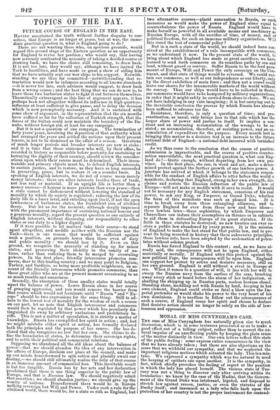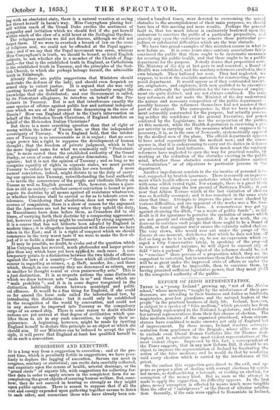MORAL OF MISS CUNYNGHAM'S CASE.
THE case of Miss Cunyngham has naturally given rise to much discussion, which is in some instances prosecuted so as to make a good effect out of a telling subject, rather than to correct the na- tural impulse of an unreflecting public by keeping the plain sense of the matter distinctly in view. Our own letters reflect this state of the public feeling: some express entire concurrence in the view that we have already taken ; but there are also objections on the score that we withheld our sympathy, and that we neglected the important religious motives which actuated the lady. This is amis- take. We expressed a sympathy which was too natural to need the heaping of epithets one upon another. It is the sympathy, in fact, whioh chiefly provokes the feeling of regret at the position in which the lady has placed herself. The -vicious state of Tus- cany was not a thing to discover only after arriving within its boundaries : we knew by the case of the If adiai, that the Goyern- ment of the Grand Duke was intolerant, bigoted, and disposed to stretch law against reason, justice, or even the statutes of -the Duchy itself; and inasmuch as a lady -who falls back upon -the protection of her country is not the proper instrument for contend- mg with an absolutist state, there is a natural vexation at seeing her thrust herself in harm's way. Miss Cunyngham placing her- self within reach of the Grand. Duke excites the sentiment of sympathy and irritation which we should feel if she put herself within reach of the claw of a wild beast at the Zoological Gardens. The religions motives we did not discuss, although we did not forget them. If we were to overlook a breach of law on the score of religious zeal, we could not be offended at the Papal aggres- sion; and if we say that the Papal movement was error, whereas miss eunyngliam's is truth, we should be bound, as loyal English subjects, to ask whether she is a member of the Church of Eng- land,—for that is the established truth in England, as Catholicism is the established truth in Tuscany, and the principles of the Scot- tish Church, to which she perhaps belongs herself, the admissible truth in Edinburgh.
Already there are public suggestions that Ministers should undertake the defence of the lady, and should even despatch an armed ship to extort justice. It is argued that she was only exerting herself on behalf of those who voluntarily sought the knowledge that she distributed; and our Government is called, by its Protestant allegiance, to interfere on behalf of the Pro- testants in Tuscany. But is not that interference exactly the same species of offence against public law and national independ- ence which we are at the present time denouncing in the case of Russia ? How can England object to the Czar's intervention on behalf of the Orthodox Greek Christians, if England interfere on behalf of the Heterodox Italian Christians P
But there is a more searching question than that of right or wrong within the letter of Tuscan law, or than the independent sovereignty of Tuscany. We in England hold, that the intoler- ance of Tuscany is as unreasonable as it is unjust ; that no sove- reign power has a right to suppress the development of human thought ; that the freedom of private judgment, which is but the more logical name for what we commonly call " Protestant- ism," is mere sacred than the established authority of the Grand Duchy, or even of some states of greater dimensions. That is our opinion; but it is not the opinion of Tuscany ; and so long as we recognize equality of rights in separate states, we must permit Tuscany to enforce her opinion within her own bounds. A more earnest conviction, indeed, might dictate to us the duty of carry- ing our opinion into Tuscany, notwithstanding the local authority —to invite the concurrence of the people and vindicate liberty on Tuscan as well as English ground. This, however, raises a ques- tion as old as society,—whether earnest conviction is bound to pro- pagate its doctrine by all means against all resistance whatsoever, or whether tolerance shall be carried so far as to tolerate even in- tolerance. Considering that absolutism does not waive the re- sources of of compulsion, there is a show of reason for the argument that the Americans are not far wrong when they upheld the duty, as Mussulinans have done before them, as Crusaders did in old times, of carrying forth their doctrine by a conquering aggression : but, however such a policy might be sustained by strong argument, it is a course that has not hitherto been adopted by England in modern times; it is altogether inconsistent with the course we have taken in the East; and it is a right of conquest which we should commence in the very worst taste if we were to make the first ob- j.e4 of it so feeble a state as Tuscany. It may be possible, no doubt, to evoke out of the question which ldiss Cunyngham has revived, much profounder and larger princi- ples than any which have yet been ipplied.to such eases. A con- temporary points to a distinction between the two kinds of offences against the laws of a country—" those which all civilized nations concur in regarding as crimes, e. g. theft, murder, &o.; and those which, though in one country they are denounced as crimes, may in another be thought venial or even praiseworthy acts." This is a just distinction. It is as respects nations the same distinction which we draw between acts " mala in se" and those which are " mala prohibits "; and it is in some degree recognized in the distinction habitually drawn between municipal and politi- cal offences. It would be it fine thing for England, if she could so far amend the loose code called the international law by introducing this distinction : but it could only be established in the recognition of the world by convention, and could not in any manner be imported into Tuscany as the compulsory cargo of an armed ship. There is some reason to doubt whether nations are yet arrived at that degree of civilization which qua- lifies them to sit in any such convention, to signify their ac- quiescence. A beginning, however, might be made by inviting England herself to declare this principle as an object at which she should aim. If our Ministers can be induced to accept the prin- ciple, it will prove that England at least has qualified herself to sit in such a convention.



























 Previous page
Previous page